Positive Psychology: Reflected Best-Self Exercise and Interventions
VerifiedAdded on 2023/04/11
|22
|5105
|316
Essay
AI Summary
This essay provides an analysis of the Reflected Best Self Exercise (RBSE) within the field of positive psychology, focusing on its efficacy in developing personal strengths and promoting a healthy, productive life. The study investigates the reflected best self through personal and professional email stories, using a qualitative research design and Consensual Qualitative Research (CQR) for data analysis. The literature review critically evaluates the strengths and weaknesses of RBSE-oriented studies, highlighting diverse methodologies and multicultural effects. The findings identify key themes such as active listening, helpful behavior, love for family, hard work, and problem-solving skills, demonstrating how RBSE promotes resilience and personal strength. The research compares personal reflection with reflections from others to assess outcomes that enhance self-potential, addressing gaps in existing literature regarding the effects of self-activation on employee performance and relationships.
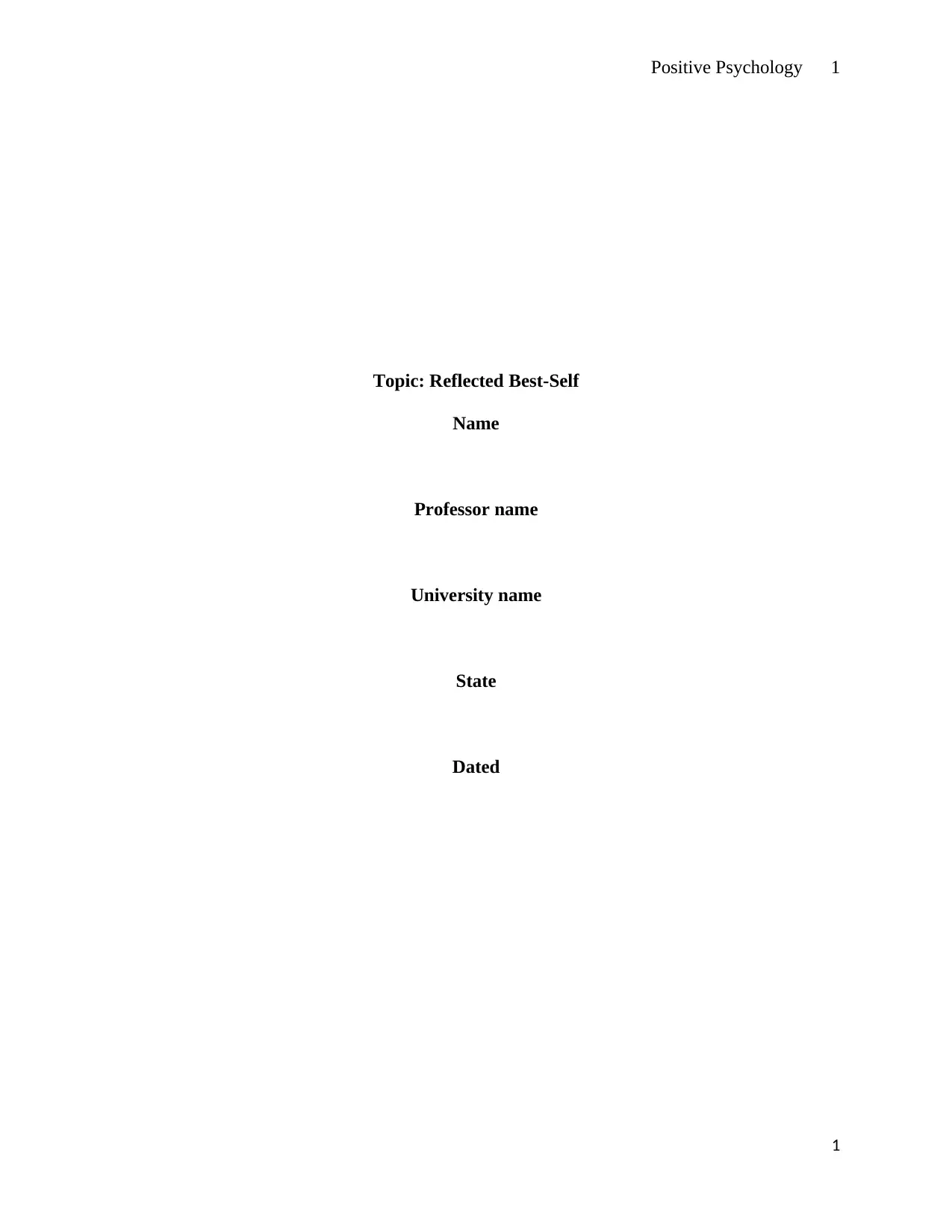
Positive Psychology 1
Topic: Reflected Best-Self
Name
Professor name
University name
State
Dated
1
Topic: Reflected Best-Self
Name
Professor name
University name
State
Dated
1
Paraphrase This Document
Need a fresh take? Get an instant paraphrase of this document with our AI Paraphraser
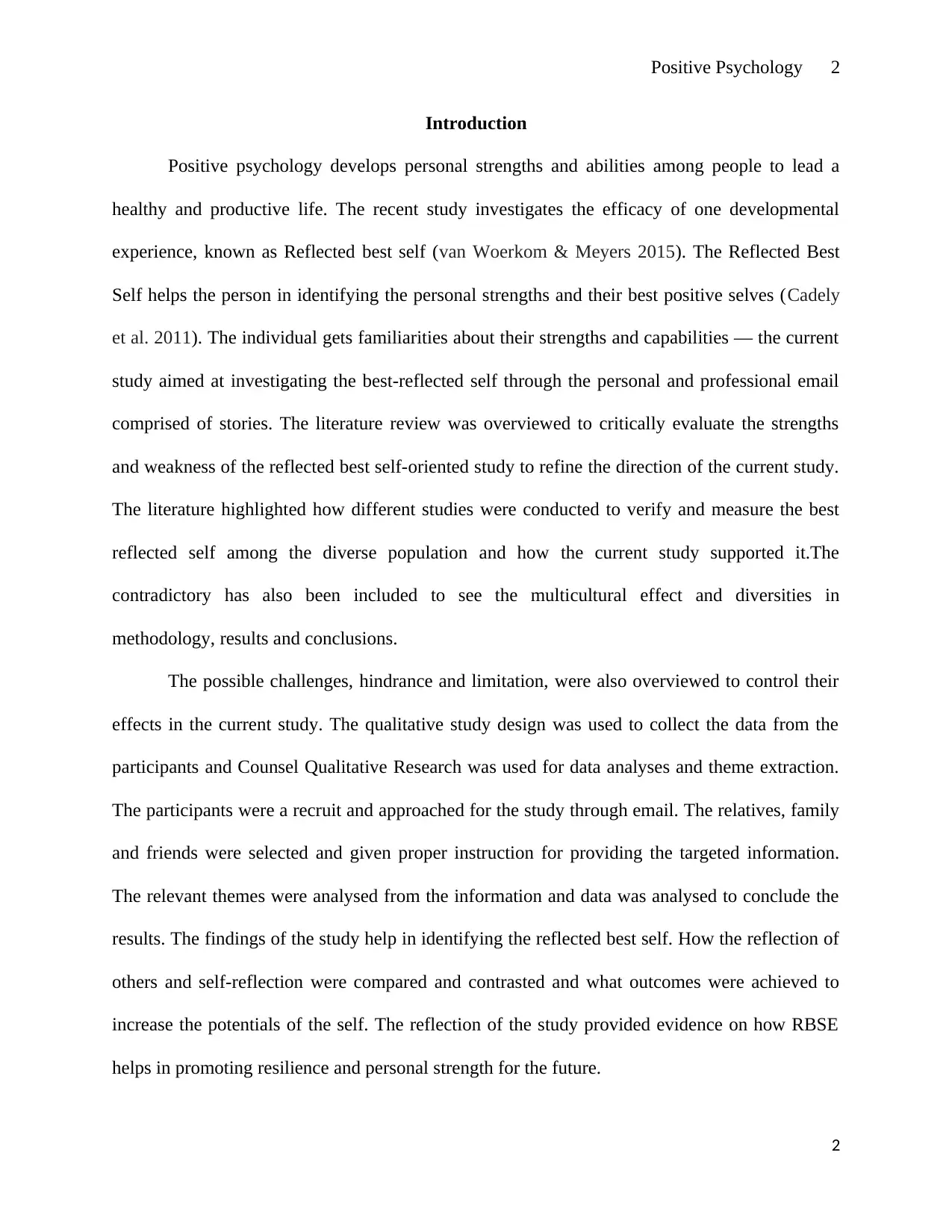
Positive Psychology 2
Introduction
Positive psychology develops personal strengths and abilities among people to lead a
healthy and productive life. The recent study investigates the efficacy of one developmental
experience, known as Reflected best self (van Woerkom & Meyers 2015). The Reflected Best
Self helps the person in identifying the personal strengths and their best positive selves (Cadely
et al. 2011). The individual gets familiarities about their strengths and capabilities — the current
study aimed at investigating the best-reflected self through the personal and professional email
comprised of stories. The literature review was overviewed to critically evaluate the strengths
and weakness of the reflected best self-oriented study to refine the direction of the current study.
The literature highlighted how different studies were conducted to verify and measure the best
reflected self among the diverse population and how the current study supported it.The
contradictory has also been included to see the multicultural effect and diversities in
methodology, results and conclusions.
The possible challenges, hindrance and limitation, were also overviewed to control their
effects in the current study. The qualitative study design was used to collect the data from the
participants and Counsel Qualitative Research was used for data analyses and theme extraction.
The participants were a recruit and approached for the study through email. The relatives, family
and friends were selected and given proper instruction for providing the targeted information.
The relevant themes were analysed from the information and data was analysed to conclude the
results. The findings of the study help in identifying the reflected best self. How the reflection of
others and self-reflection were compared and contrasted and what outcomes were achieved to
increase the potentials of the self. The reflection of the study provided evidence on how RBSE
helps in promoting resilience and personal strength for the future.
2
Introduction
Positive psychology develops personal strengths and abilities among people to lead a
healthy and productive life. The recent study investigates the efficacy of one developmental
experience, known as Reflected best self (van Woerkom & Meyers 2015). The Reflected Best
Self helps the person in identifying the personal strengths and their best positive selves (Cadely
et al. 2011). The individual gets familiarities about their strengths and capabilities — the current
study aimed at investigating the best-reflected self through the personal and professional email
comprised of stories. The literature review was overviewed to critically evaluate the strengths
and weakness of the reflected best self-oriented study to refine the direction of the current study.
The literature highlighted how different studies were conducted to verify and measure the best
reflected self among the diverse population and how the current study supported it.The
contradictory has also been included to see the multicultural effect and diversities in
methodology, results and conclusions.
The possible challenges, hindrance and limitation, were also overviewed to control their
effects in the current study. The qualitative study design was used to collect the data from the
participants and Counsel Qualitative Research was used for data analyses and theme extraction.
The participants were a recruit and approached for the study through email. The relatives, family
and friends were selected and given proper instruction for providing the targeted information.
The relevant themes were analysed from the information and data was analysed to conclude the
results. The findings of the study help in identifying the reflected best self. How the reflection of
others and self-reflection were compared and contrasted and what outcomes were achieved to
increase the potentials of the self. The reflection of the study provided evidence on how RBSE
helps in promoting resilience and personal strength for the future.
2
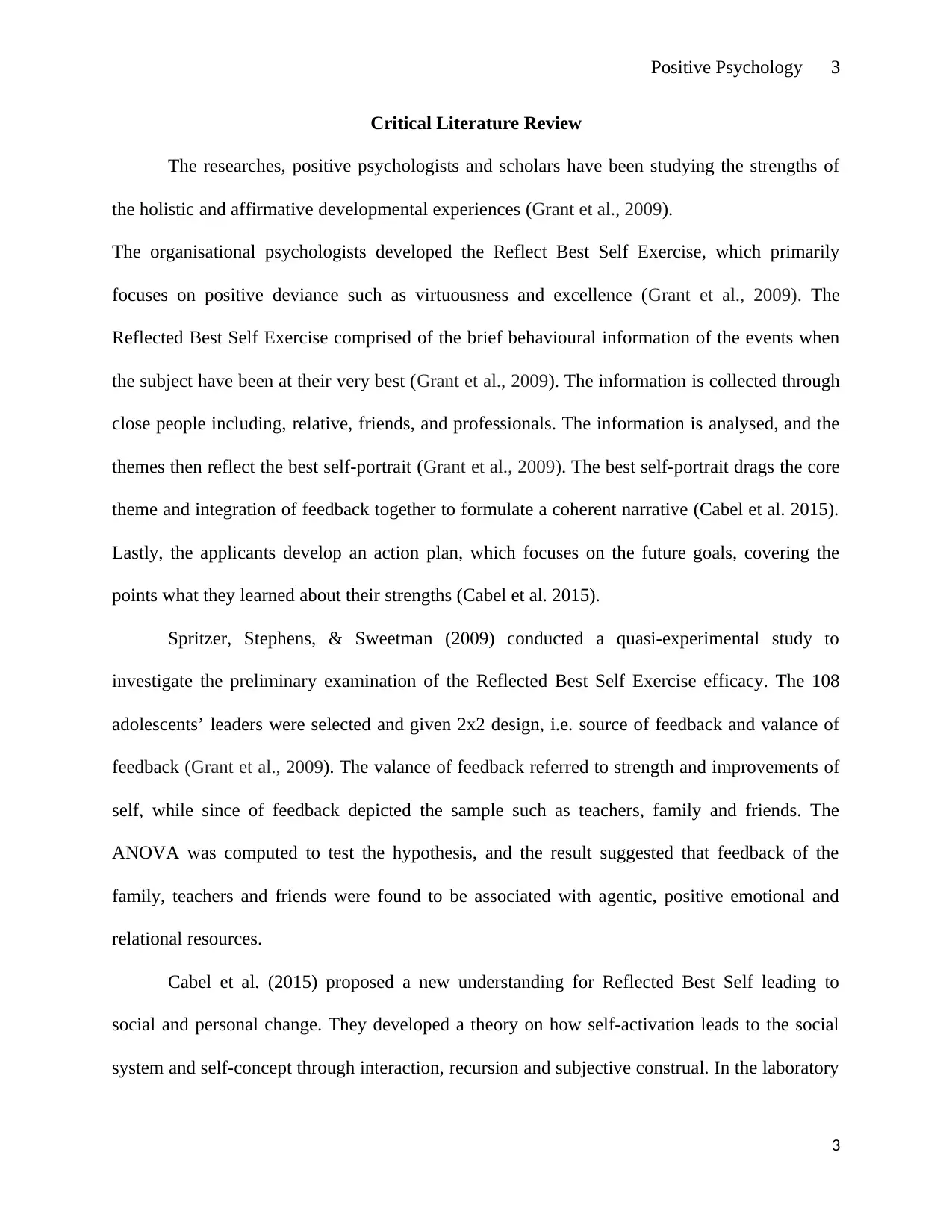
Positive Psychology 3
Critical Literature Review
The researches, positive psychologists and scholars have been studying the strengths of
the holistic and affirmative developmental experiences (Grant et al., 2009).
The organisational psychologists developed the Reflect Best Self Exercise, which primarily
focuses on positive deviance such as virtuousness and excellence (Grant et al., 2009). The
Reflected Best Self Exercise comprised of the brief behavioural information of the events when
the subject have been at their very best (Grant et al., 2009). The information is collected through
close people including, relative, friends, and professionals. The information is analysed, and the
themes then reflect the best self-portrait (Grant et al., 2009). The best self-portrait drags the core
theme and integration of feedback together to formulate a coherent narrative (Cabel et al. 2015).
Lastly, the applicants develop an action plan, which focuses on the future goals, covering the
points what they learned about their strengths (Cabel et al. 2015).
Spritzer, Stephens, & Sweetman (2009) conducted a quasi-experimental study to
investigate the preliminary examination of the Reflected Best Self Exercise efficacy. The 108
adolescents’ leaders were selected and given 2x2 design, i.e. source of feedback and valance of
feedback (Grant et al., 2009). The valance of feedback referred to strength and improvements of
self, while since of feedback depicted the sample such as teachers, family and friends. The
ANOVA was computed to test the hypothesis, and the result suggested that feedback of the
family, teachers and friends were found to be associated with agentic, positive emotional and
relational resources.
Cabel et al. (2015) proposed a new understanding for Reflected Best Self leading to
social and personal change. They developed a theory on how self-activation leads to the social
system and self-concept through interaction, recursion and subjective construal. In the laboratory
3
Critical Literature Review
The researches, positive psychologists and scholars have been studying the strengths of
the holistic and affirmative developmental experiences (Grant et al., 2009).
The organisational psychologists developed the Reflect Best Self Exercise, which primarily
focuses on positive deviance such as virtuousness and excellence (Grant et al., 2009). The
Reflected Best Self Exercise comprised of the brief behavioural information of the events when
the subject have been at their very best (Grant et al., 2009). The information is collected through
close people including, relative, friends, and professionals. The information is analysed, and the
themes then reflect the best self-portrait (Grant et al., 2009). The best self-portrait drags the core
theme and integration of feedback together to formulate a coherent narrative (Cabel et al. 2015).
Lastly, the applicants develop an action plan, which focuses on the future goals, covering the
points what they learned about their strengths (Cabel et al. 2015).
Spritzer, Stephens, & Sweetman (2009) conducted a quasi-experimental study to
investigate the preliminary examination of the Reflected Best Self Exercise efficacy. The 108
adolescents’ leaders were selected and given 2x2 design, i.e. source of feedback and valance of
feedback (Grant et al., 2009). The valance of feedback referred to strength and improvements of
self, while since of feedback depicted the sample such as teachers, family and friends. The
ANOVA was computed to test the hypothesis, and the result suggested that feedback of the
family, teachers and friends were found to be associated with agentic, positive emotional and
relational resources.
Cabel et al. (2015) proposed a new understanding for Reflected Best Self leading to
social and personal change. They developed a theory on how self-activation leads to the social
system and self-concept through interaction, recursion and subjective construal. In the laboratory
3
⊘ This is a preview!⊘
Do you want full access?
Subscribe today to unlock all pages.

Trusted by 1+ million students worldwide
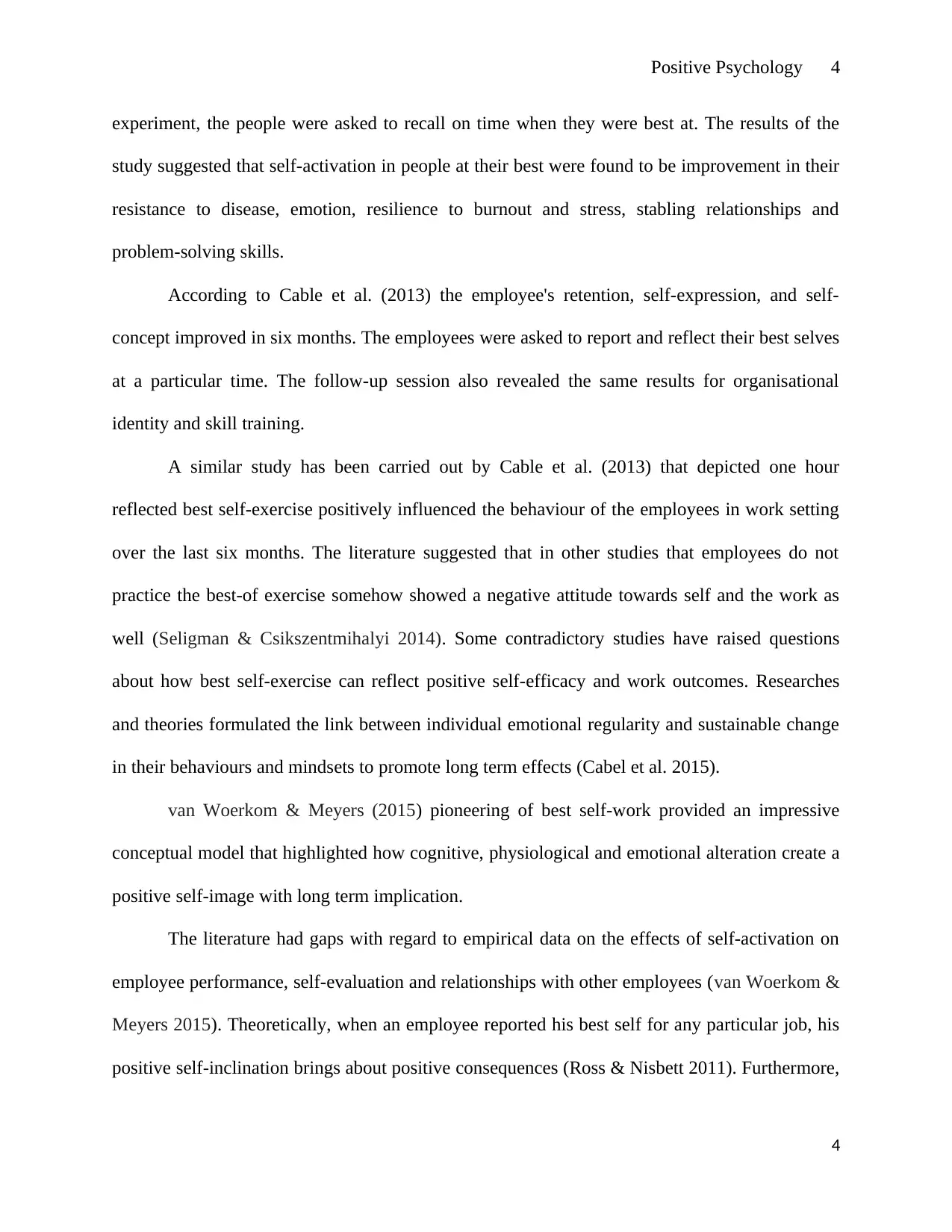
Positive Psychology 4
experiment, the people were asked to recall on time when they were best at. The results of the
study suggested that self-activation in people at their best were found to be improvement in their
resistance to disease, emotion, resilience to burnout and stress, stabling relationships and
problem-solving skills.
According to Cable et al. (2013) the employee's retention, self-expression, and self-
concept improved in six months. The employees were asked to report and reflect their best selves
at a particular time. The follow-up session also revealed the same results for organisational
identity and skill training.
A similar study has been carried out by Cable et al. (2013) that depicted one hour
reflected best self-exercise positively influenced the behaviour of the employees in work setting
over the last six months. The literature suggested that in other studies that employees do not
practice the best-of exercise somehow showed a negative attitude towards self and the work as
well (Seligman & Csikszentmihalyi 2014). Some contradictory studies have raised questions
about how best self-exercise can reflect positive self-efficacy and work outcomes. Researches
and theories formulated the link between individual emotional regularity and sustainable change
in their behaviours and mindsets to promote long term effects (Cabel et al. 2015).
van Woerkom & Meyers (2015) pioneering of best self-work provided an impressive
conceptual model that highlighted how cognitive, physiological and emotional alteration create a
positive self-image with long term implication.
The literature had gaps with regard to empirical data on the effects of self-activation on
employee performance, self-evaluation and relationships with other employees (van Woerkom &
Meyers 2015). Theoretically, when an employee reported his best self for any particular job, his
positive self-inclination brings about positive consequences (Ross & Nisbett 2011). Furthermore,
4
experiment, the people were asked to recall on time when they were best at. The results of the
study suggested that self-activation in people at their best were found to be improvement in their
resistance to disease, emotion, resilience to burnout and stress, stabling relationships and
problem-solving skills.
According to Cable et al. (2013) the employee's retention, self-expression, and self-
concept improved in six months. The employees were asked to report and reflect their best selves
at a particular time. The follow-up session also revealed the same results for organisational
identity and skill training.
A similar study has been carried out by Cable et al. (2013) that depicted one hour
reflected best self-exercise positively influenced the behaviour of the employees in work setting
over the last six months. The literature suggested that in other studies that employees do not
practice the best-of exercise somehow showed a negative attitude towards self and the work as
well (Seligman & Csikszentmihalyi 2014). Some contradictory studies have raised questions
about how best self-exercise can reflect positive self-efficacy and work outcomes. Researches
and theories formulated the link between individual emotional regularity and sustainable change
in their behaviours and mindsets to promote long term effects (Cabel et al. 2015).
van Woerkom & Meyers (2015) pioneering of best self-work provided an impressive
conceptual model that highlighted how cognitive, physiological and emotional alteration create a
positive self-image with long term implication.
The literature had gaps with regard to empirical data on the effects of self-activation on
employee performance, self-evaluation and relationships with other employees (van Woerkom &
Meyers 2015). Theoretically, when an employee reported his best self for any particular job, his
positive self-inclination brings about positive consequences (Ross & Nisbett 2011). Furthermore,
4
Paraphrase This Document
Need a fresh take? Get an instant paraphrase of this document with our AI Paraphraser
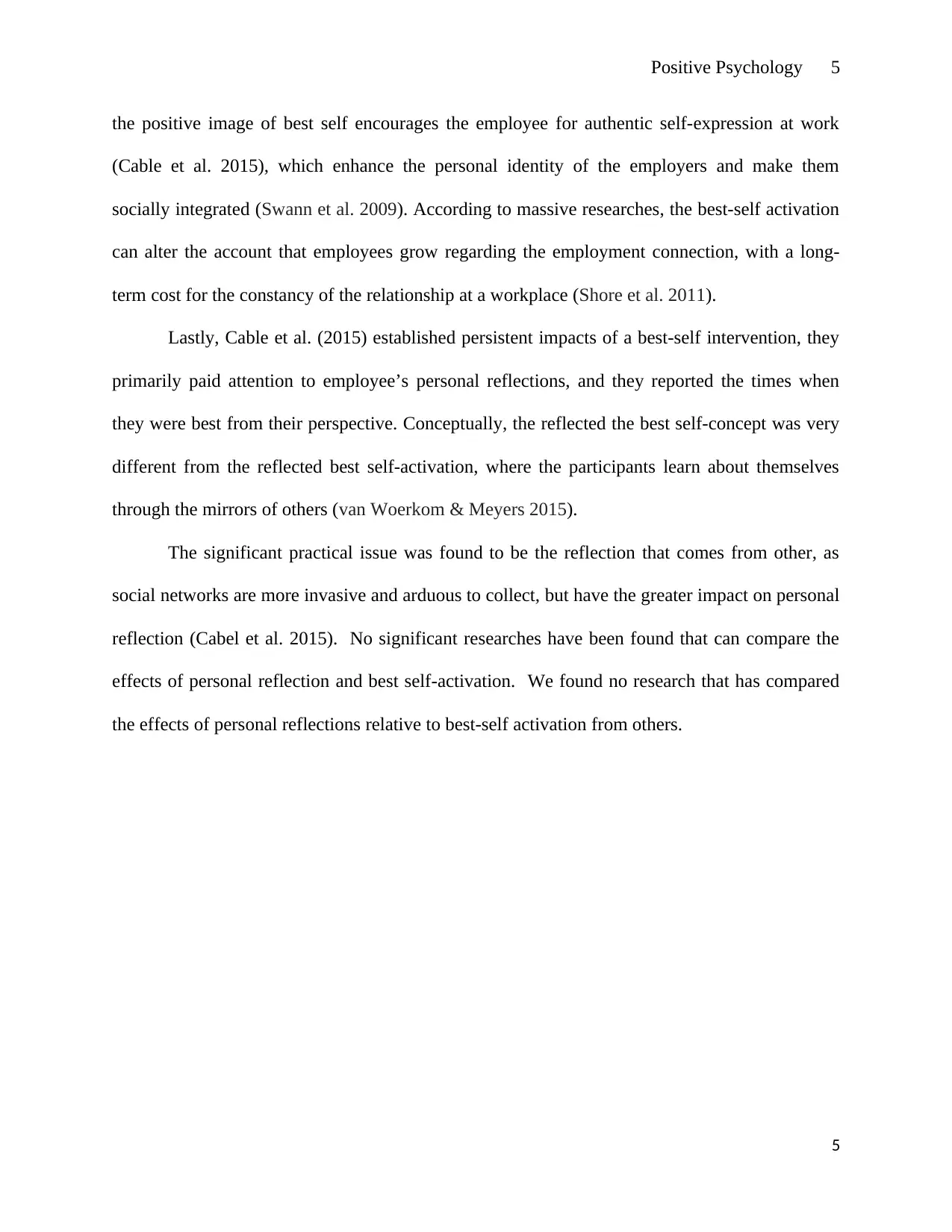
Positive Psychology 5
the positive image of best self encourages the employee for authentic self-expression at work
(Cable et al. 2015), which enhance the personal identity of the employers and make them
socially integrated (Swann et al. 2009). According to massive researches, the best-self activation
can alter the account that employees grow regarding the employment connection, with a long-
term cost for the constancy of the relationship at a workplace (Shore et al. 2011).
Lastly, Cable et al. (2015) established persistent impacts of a best-self intervention, they
primarily paid attention to employee’s personal reflections, and they reported the times when
they were best from their perspective. Conceptually, the reflected the best self-concept was very
different from the reflected best self-activation, where the participants learn about themselves
through the mirrors of others (van Woerkom & Meyers 2015).
The significant practical issue was found to be the reflection that comes from other, as
social networks are more invasive and arduous to collect, but have the greater impact on personal
reflection (Cabel et al. 2015). No significant researches have been found that can compare the
effects of personal reflection and best self-activation. We found no research that has compared
the effects of personal reflections relative to best-self activation from others.
5
the positive image of best self encourages the employee for authentic self-expression at work
(Cable et al. 2015), which enhance the personal identity of the employers and make them
socially integrated (Swann et al. 2009). According to massive researches, the best-self activation
can alter the account that employees grow regarding the employment connection, with a long-
term cost for the constancy of the relationship at a workplace (Shore et al. 2011).
Lastly, Cable et al. (2015) established persistent impacts of a best-self intervention, they
primarily paid attention to employee’s personal reflections, and they reported the times when
they were best from their perspective. Conceptually, the reflected the best self-concept was very
different from the reflected best self-activation, where the participants learn about themselves
through the mirrors of others (van Woerkom & Meyers 2015).
The significant practical issue was found to be the reflection that comes from other, as
social networks are more invasive and arduous to collect, but have the greater impact on personal
reflection (Cabel et al. 2015). No significant researches have been found that can compare the
effects of personal reflection and best self-activation. We found no research that has compared
the effects of personal reflections relative to best-self activation from others.
5
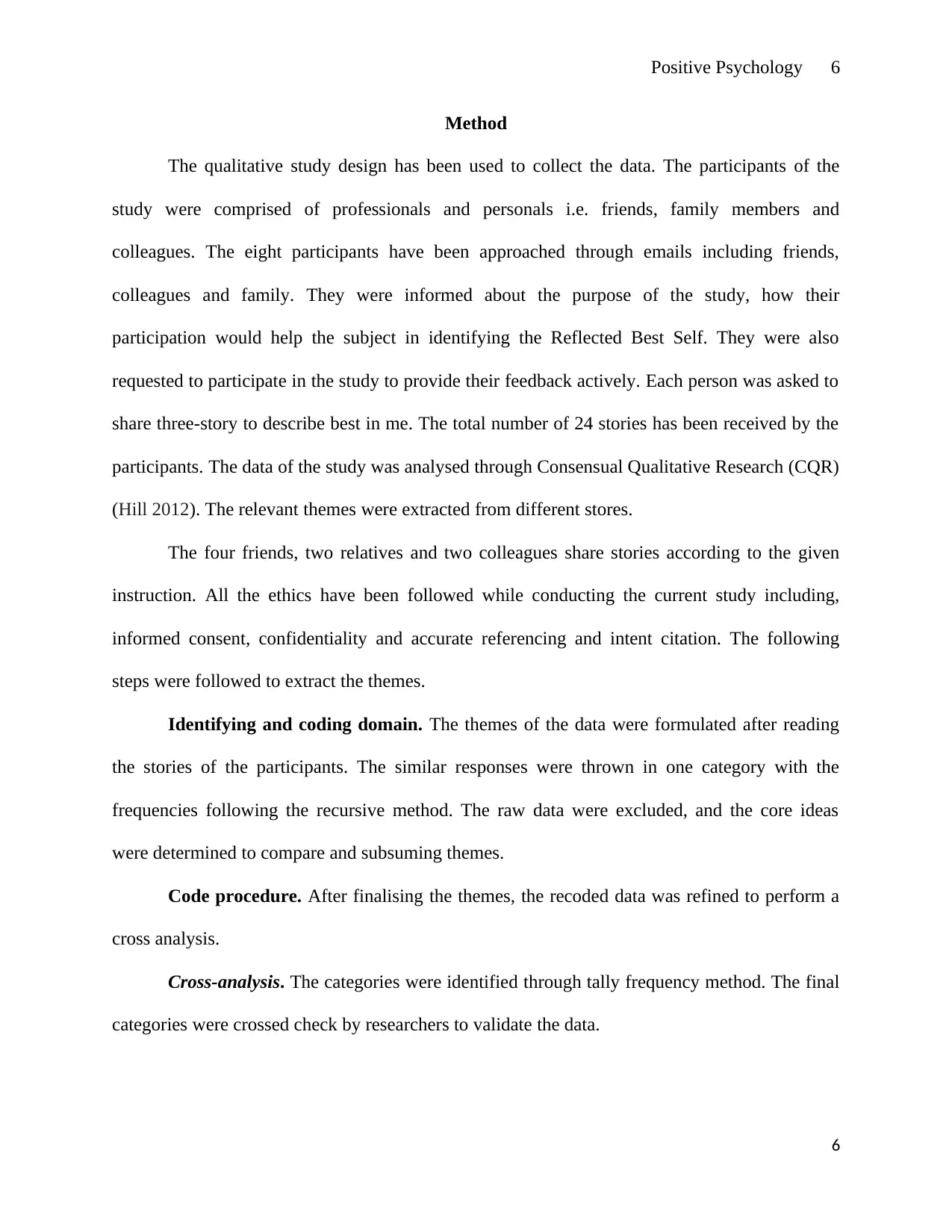
Positive Psychology 6
Method
The qualitative study design has been used to collect the data. The participants of the
study were comprised of professionals and personals i.e. friends, family members and
colleagues. The eight participants have been approached through emails including friends,
colleagues and family. They were informed about the purpose of the study, how their
participation would help the subject in identifying the Reflected Best Self. They were also
requested to participate in the study to provide their feedback actively. Each person was asked to
share three-story to describe best in me. The total number of 24 stories has been received by the
participants. The data of the study was analysed through Consensual Qualitative Research (CQR)
(Hill 2012). The relevant themes were extracted from different stores.
The four friends, two relatives and two colleagues share stories according to the given
instruction. All the ethics have been followed while conducting the current study including,
informed consent, confidentiality and accurate referencing and intent citation. The following
steps were followed to extract the themes.
Identifying and coding domain. The themes of the data were formulated after reading
the stories of the participants. The similar responses were thrown in one category with the
frequencies following the recursive method. The raw data were excluded, and the core ideas
were determined to compare and subsuming themes.
Code procedure. After finalising the themes, the recoded data was refined to perform a
cross analysis.
Cross-analysis. The categories were identified through tally frequency method. The final
categories were crossed check by researchers to validate the data.
6
Method
The qualitative study design has been used to collect the data. The participants of the
study were comprised of professionals and personals i.e. friends, family members and
colleagues. The eight participants have been approached through emails including friends,
colleagues and family. They were informed about the purpose of the study, how their
participation would help the subject in identifying the Reflected Best Self. They were also
requested to participate in the study to provide their feedback actively. Each person was asked to
share three-story to describe best in me. The total number of 24 stories has been received by the
participants. The data of the study was analysed through Consensual Qualitative Research (CQR)
(Hill 2012). The relevant themes were extracted from different stores.
The four friends, two relatives and two colleagues share stories according to the given
instruction. All the ethics have been followed while conducting the current study including,
informed consent, confidentiality and accurate referencing and intent citation. The following
steps were followed to extract the themes.
Identifying and coding domain. The themes of the data were formulated after reading
the stories of the participants. The similar responses were thrown in one category with the
frequencies following the recursive method. The raw data were excluded, and the core ideas
were determined to compare and subsuming themes.
Code procedure. After finalising the themes, the recoded data was refined to perform a
cross analysis.
Cross-analysis. The categories were identified through tally frequency method. The final
categories were crossed check by researchers to validate the data.
6
⊘ This is a preview!⊘
Do you want full access?
Subscribe today to unlock all pages.

Trusted by 1+ million students worldwide
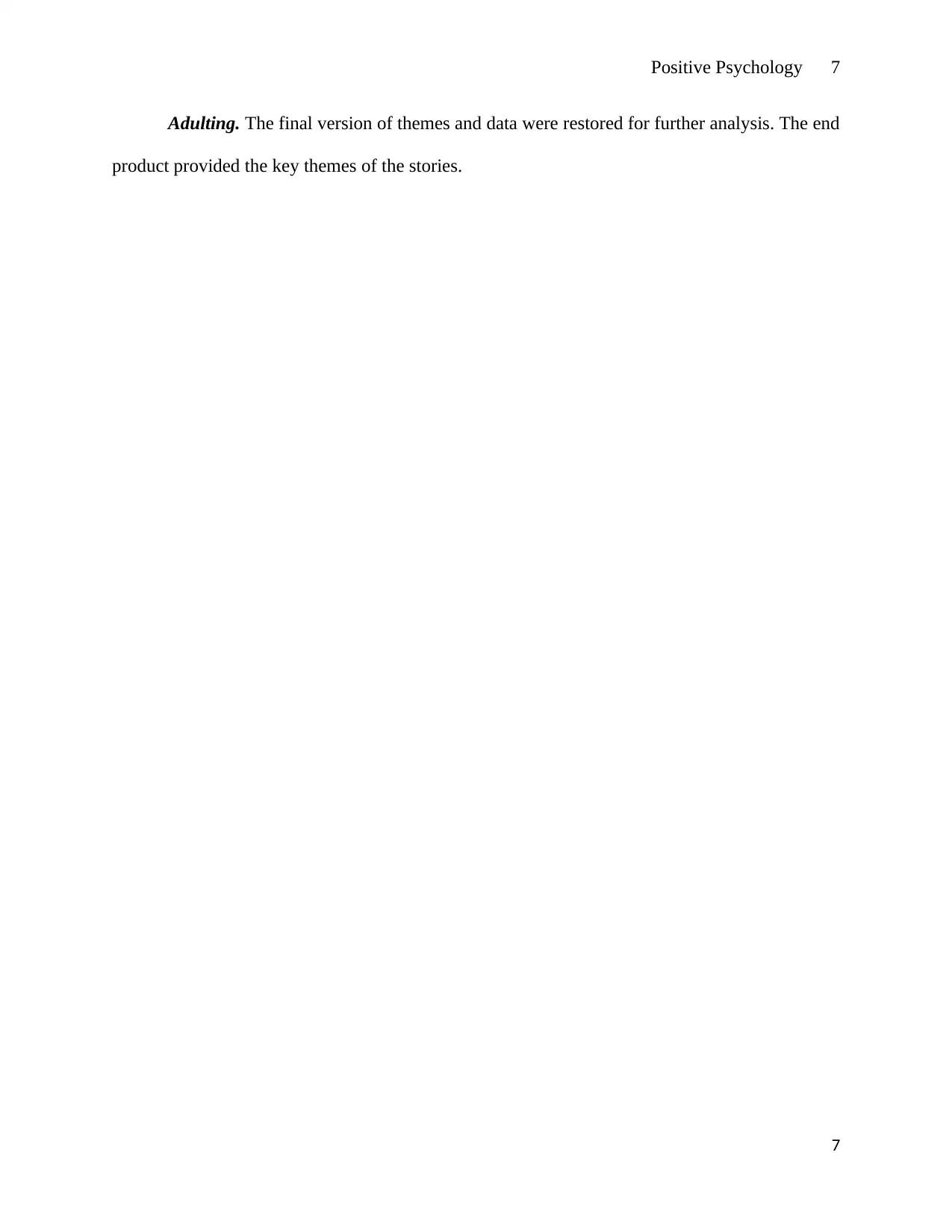
Positive Psychology 7
Adulting. The final version of themes and data were restored for further analysis. The end
product provided the key themes of the stories.
7
Adulting. The final version of themes and data were restored for further analysis. The end
product provided the key themes of the stories.
7
Paraphrase This Document
Need a fresh take? Get an instant paraphrase of this document with our AI Paraphraser
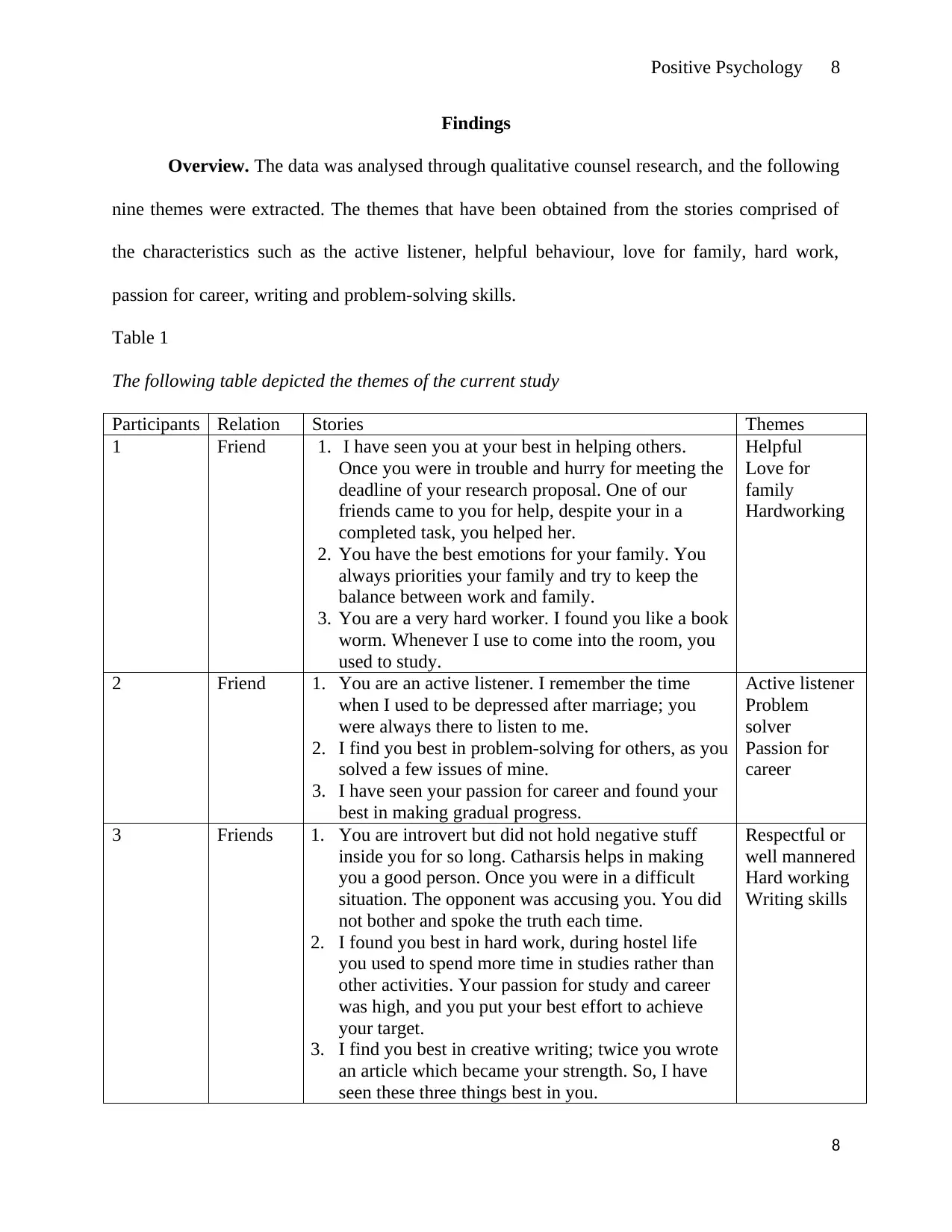
Positive Psychology 8
Findings
Overview. The data was analysed through qualitative counsel research, and the following
nine themes were extracted. The themes that have been obtained from the stories comprised of
the characteristics such as the active listener, helpful behaviour, love for family, hard work,
passion for career, writing and problem-solving skills.
Table 1
The following table depicted the themes of the current study
Participants Relation Stories Themes
1 Friend 1. I have seen you at your best in helping others.
Once you were in trouble and hurry for meeting the
deadline of your research proposal. One of our
friends came to you for help, despite your in a
completed task, you helped her.
2. You have the best emotions for your family. You
always priorities your family and try to keep the
balance between work and family.
3. You are a very hard worker. I found you like a book
worm. Whenever I use to come into the room, you
used to study.
Helpful
Love for
family
Hardworking
2 Friend 1. You are an active listener. I remember the time
when I used to be depressed after marriage; you
were always there to listen to me.
2. I find you best in problem-solving for others, as you
solved a few issues of mine.
3. I have seen your passion for career and found your
best in making gradual progress.
Active listener
Problem
solver
Passion for
career
3 Friends 1. You are introvert but did not hold negative stuff
inside you for so long. Catharsis helps in making
you a good person. Once you were in a difficult
situation. The opponent was accusing you. You did
not bother and spoke the truth each time.
2. I found you best in hard work, during hostel life
you used to spend more time in studies rather than
other activities. Your passion for study and career
was high, and you put your best effort to achieve
your target.
3. I find you best in creative writing; twice you wrote
an article which became your strength. So, I have
seen these three things best in you.
Respectful or
well mannered
Hard working
Writing skills
8
Findings
Overview. The data was analysed through qualitative counsel research, and the following
nine themes were extracted. The themes that have been obtained from the stories comprised of
the characteristics such as the active listener, helpful behaviour, love for family, hard work,
passion for career, writing and problem-solving skills.
Table 1
The following table depicted the themes of the current study
Participants Relation Stories Themes
1 Friend 1. I have seen you at your best in helping others.
Once you were in trouble and hurry for meeting the
deadline of your research proposal. One of our
friends came to you for help, despite your in a
completed task, you helped her.
2. You have the best emotions for your family. You
always priorities your family and try to keep the
balance between work and family.
3. You are a very hard worker. I found you like a book
worm. Whenever I use to come into the room, you
used to study.
Helpful
Love for
family
Hardworking
2 Friend 1. You are an active listener. I remember the time
when I used to be depressed after marriage; you
were always there to listen to me.
2. I find you best in problem-solving for others, as you
solved a few issues of mine.
3. I have seen your passion for career and found your
best in making gradual progress.
Active listener
Problem
solver
Passion for
career
3 Friends 1. You are introvert but did not hold negative stuff
inside you for so long. Catharsis helps in making
you a good person. Once you were in a difficult
situation. The opponent was accusing you. You did
not bother and spoke the truth each time.
2. I found you best in hard work, during hostel life
you used to spend more time in studies rather than
other activities. Your passion for study and career
was high, and you put your best effort to achieve
your target.
3. I find you best in creative writing; twice you wrote
an article which became your strength. So, I have
seen these three things best in you.
Respectful or
well mannered
Hard working
Writing skills
8
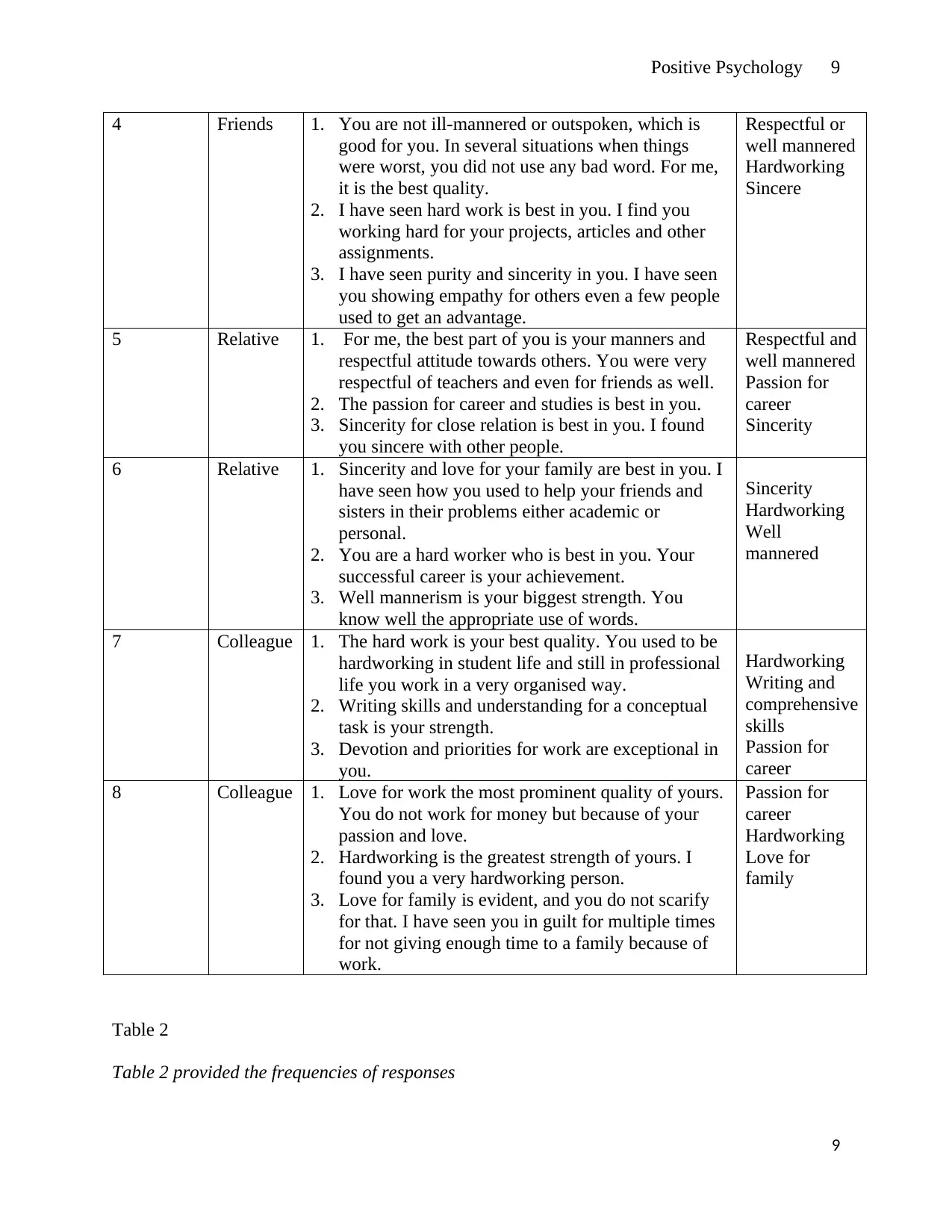
Positive Psychology 9
4 Friends 1. You are not ill-mannered or outspoken, which is
good for you. In several situations when things
were worst, you did not use any bad word. For me,
it is the best quality.
2. I have seen hard work is best in you. I find you
working hard for your projects, articles and other
assignments.
3. I have seen purity and sincerity in you. I have seen
you showing empathy for others even a few people
used to get an advantage.
Respectful or
well mannered
Hardworking
Sincere
5 Relative 1. For me, the best part of you is your manners and
respectful attitude towards others. You were very
respectful of teachers and even for friends as well.
2. The passion for career and studies is best in you.
3. Sincerity for close relation is best in you. I found
you sincere with other people.
Respectful and
well mannered
Passion for
career
Sincerity
6 Relative 1. Sincerity and love for your family are best in you. I
have seen how you used to help your friends and
sisters in their problems either academic or
personal.
2. You are a hard worker who is best in you. Your
successful career is your achievement.
3. Well mannerism is your biggest strength. You
know well the appropriate use of words.
Sincerity
Hardworking
Well
mannered
7 Colleague 1. The hard work is your best quality. You used to be
hardworking in student life and still in professional
life you work in a very organised way.
2. Writing skills and understanding for a conceptual
task is your strength.
3. Devotion and priorities for work are exceptional in
you.
Hardworking
Writing and
comprehensive
skills
Passion for
career
8 Colleague 1. Love for work the most prominent quality of yours.
You do not work for money but because of your
passion and love.
2. Hardworking is the greatest strength of yours. I
found you a very hardworking person.
3. Love for family is evident, and you do not scarify
for that. I have seen you in guilt for multiple times
for not giving enough time to a family because of
work.
Passion for
career
Hardworking
Love for
family
Table 2
Table 2 provided the frequencies of responses
9
4 Friends 1. You are not ill-mannered or outspoken, which is
good for you. In several situations when things
were worst, you did not use any bad word. For me,
it is the best quality.
2. I have seen hard work is best in you. I find you
working hard for your projects, articles and other
assignments.
3. I have seen purity and sincerity in you. I have seen
you showing empathy for others even a few people
used to get an advantage.
Respectful or
well mannered
Hardworking
Sincere
5 Relative 1. For me, the best part of you is your manners and
respectful attitude towards others. You were very
respectful of teachers and even for friends as well.
2. The passion for career and studies is best in you.
3. Sincerity for close relation is best in you. I found
you sincere with other people.
Respectful and
well mannered
Passion for
career
Sincerity
6 Relative 1. Sincerity and love for your family are best in you. I
have seen how you used to help your friends and
sisters in their problems either academic or
personal.
2. You are a hard worker who is best in you. Your
successful career is your achievement.
3. Well mannerism is your biggest strength. You
know well the appropriate use of words.
Sincerity
Hardworking
Well
mannered
7 Colleague 1. The hard work is your best quality. You used to be
hardworking in student life and still in professional
life you work in a very organised way.
2. Writing skills and understanding for a conceptual
task is your strength.
3. Devotion and priorities for work are exceptional in
you.
Hardworking
Writing and
comprehensive
skills
Passion for
career
8 Colleague 1. Love for work the most prominent quality of yours.
You do not work for money but because of your
passion and love.
2. Hardworking is the greatest strength of yours. I
found you a very hardworking person.
3. Love for family is evident, and you do not scarify
for that. I have seen you in guilt for multiple times
for not giving enough time to a family because of
work.
Passion for
career
Hardworking
Love for
family
Table 2
Table 2 provided the frequencies of responses
9
⊘ This is a preview!⊘
Do you want full access?
Subscribe today to unlock all pages.

Trusted by 1+ million students worldwide
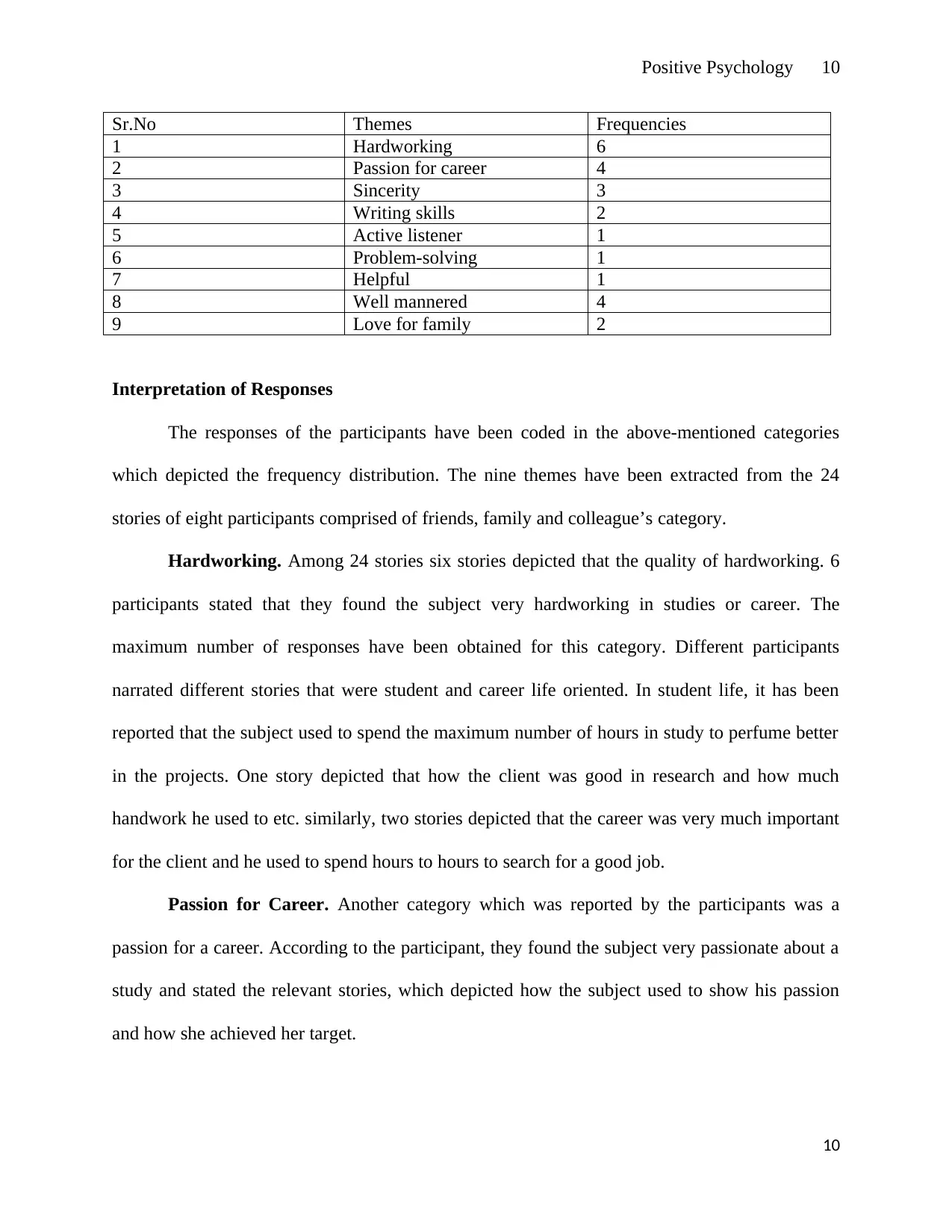
Positive Psychology 10
Sr.No Themes Frequencies
1 Hardworking 6
2 Passion for career 4
3 Sincerity 3
4 Writing skills 2
5 Active listener 1
6 Problem-solving 1
7 Helpful 1
8 Well mannered 4
9 Love for family 2
Interpretation of Responses
The responses of the participants have been coded in the above-mentioned categories
which depicted the frequency distribution. The nine themes have been extracted from the 24
stories of eight participants comprised of friends, family and colleague’s category.
Hardworking. Among 24 stories six stories depicted that the quality of hardworking. 6
participants stated that they found the subject very hardworking in studies or career. The
maximum number of responses have been obtained for this category. Different participants
narrated different stories that were student and career life oriented. In student life, it has been
reported that the subject used to spend the maximum number of hours in study to perfume better
in the projects. One story depicted that how the client was good in research and how much
handwork he used to etc. similarly, two stories depicted that the career was very much important
for the client and he used to spend hours to hours to search for a good job.
Passion for Career. Another category which was reported by the participants was a
passion for a career. According to the participant, they found the subject very passionate about a
study and stated the relevant stories, which depicted how the subject used to show his passion
and how she achieved her target.
10
Sr.No Themes Frequencies
1 Hardworking 6
2 Passion for career 4
3 Sincerity 3
4 Writing skills 2
5 Active listener 1
6 Problem-solving 1
7 Helpful 1
8 Well mannered 4
9 Love for family 2
Interpretation of Responses
The responses of the participants have been coded in the above-mentioned categories
which depicted the frequency distribution. The nine themes have been extracted from the 24
stories of eight participants comprised of friends, family and colleague’s category.
Hardworking. Among 24 stories six stories depicted that the quality of hardworking. 6
participants stated that they found the subject very hardworking in studies or career. The
maximum number of responses have been obtained for this category. Different participants
narrated different stories that were student and career life oriented. In student life, it has been
reported that the subject used to spend the maximum number of hours in study to perfume better
in the projects. One story depicted that how the client was good in research and how much
handwork he used to etc. similarly, two stories depicted that the career was very much important
for the client and he used to spend hours to hours to search for a good job.
Passion for Career. Another category which was reported by the participants was a
passion for a career. According to the participant, they found the subject very passionate about a
study and stated the relevant stories, which depicted how the subject used to show his passion
and how she achieved her target.
10
Paraphrase This Document
Need a fresh take? Get an instant paraphrase of this document with our AI Paraphraser
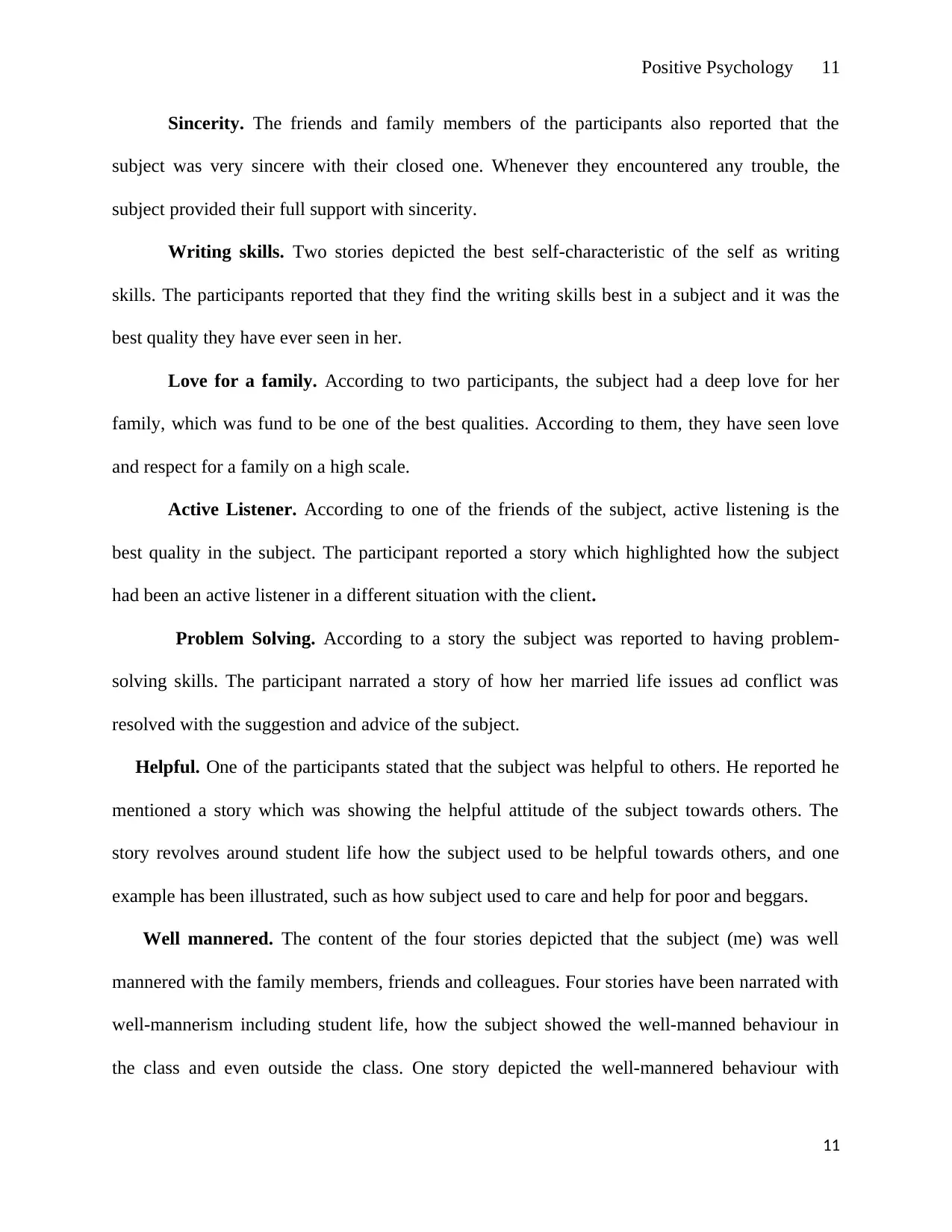
Positive Psychology 11
Sincerity. The friends and family members of the participants also reported that the
subject was very sincere with their closed one. Whenever they encountered any trouble, the
subject provided their full support with sincerity.
Writing skills. Two stories depicted the best self-characteristic of the self as writing
skills. The participants reported that they find the writing skills best in a subject and it was the
best quality they have ever seen in her.
Love for a family. According to two participants, the subject had a deep love for her
family, which was fund to be one of the best qualities. According to them, they have seen love
and respect for a family on a high scale.
Active Listener. According to one of the friends of the subject, active listening is the
best quality in the subject. The participant reported a story which highlighted how the subject
had been an active listener in a different situation with the client.
Problem Solving. According to a story the subject was reported to having problem-
solving skills. The participant narrated a story of how her married life issues ad conflict was
resolved with the suggestion and advice of the subject.
Helpful. One of the participants stated that the subject was helpful to others. He reported he
mentioned a story which was showing the helpful attitude of the subject towards others. The
story revolves around student life how the subject used to be helpful towards others, and one
example has been illustrated, such as how subject used to care and help for poor and beggars.
Well mannered. The content of the four stories depicted that the subject (me) was well
mannered with the family members, friends and colleagues. Four stories have been narrated with
well-mannerism including student life, how the subject showed the well-manned behaviour in
the class and even outside the class. One story depicted the well-mannered behaviour with
11
Sincerity. The friends and family members of the participants also reported that the
subject was very sincere with their closed one. Whenever they encountered any trouble, the
subject provided their full support with sincerity.
Writing skills. Two stories depicted the best self-characteristic of the self as writing
skills. The participants reported that they find the writing skills best in a subject and it was the
best quality they have ever seen in her.
Love for a family. According to two participants, the subject had a deep love for her
family, which was fund to be one of the best qualities. According to them, they have seen love
and respect for a family on a high scale.
Active Listener. According to one of the friends of the subject, active listening is the
best quality in the subject. The participant reported a story which highlighted how the subject
had been an active listener in a different situation with the client.
Problem Solving. According to a story the subject was reported to having problem-
solving skills. The participant narrated a story of how her married life issues ad conflict was
resolved with the suggestion and advice of the subject.
Helpful. One of the participants stated that the subject was helpful to others. He reported he
mentioned a story which was showing the helpful attitude of the subject towards others. The
story revolves around student life how the subject used to be helpful towards others, and one
example has been illustrated, such as how subject used to care and help for poor and beggars.
Well mannered. The content of the four stories depicted that the subject (me) was well
mannered with the family members, friends and colleagues. Four stories have been narrated with
well-mannerism including student life, how the subject showed the well-manned behaviour in
the class and even outside the class. One story depicted the well-mannered behaviour with
11
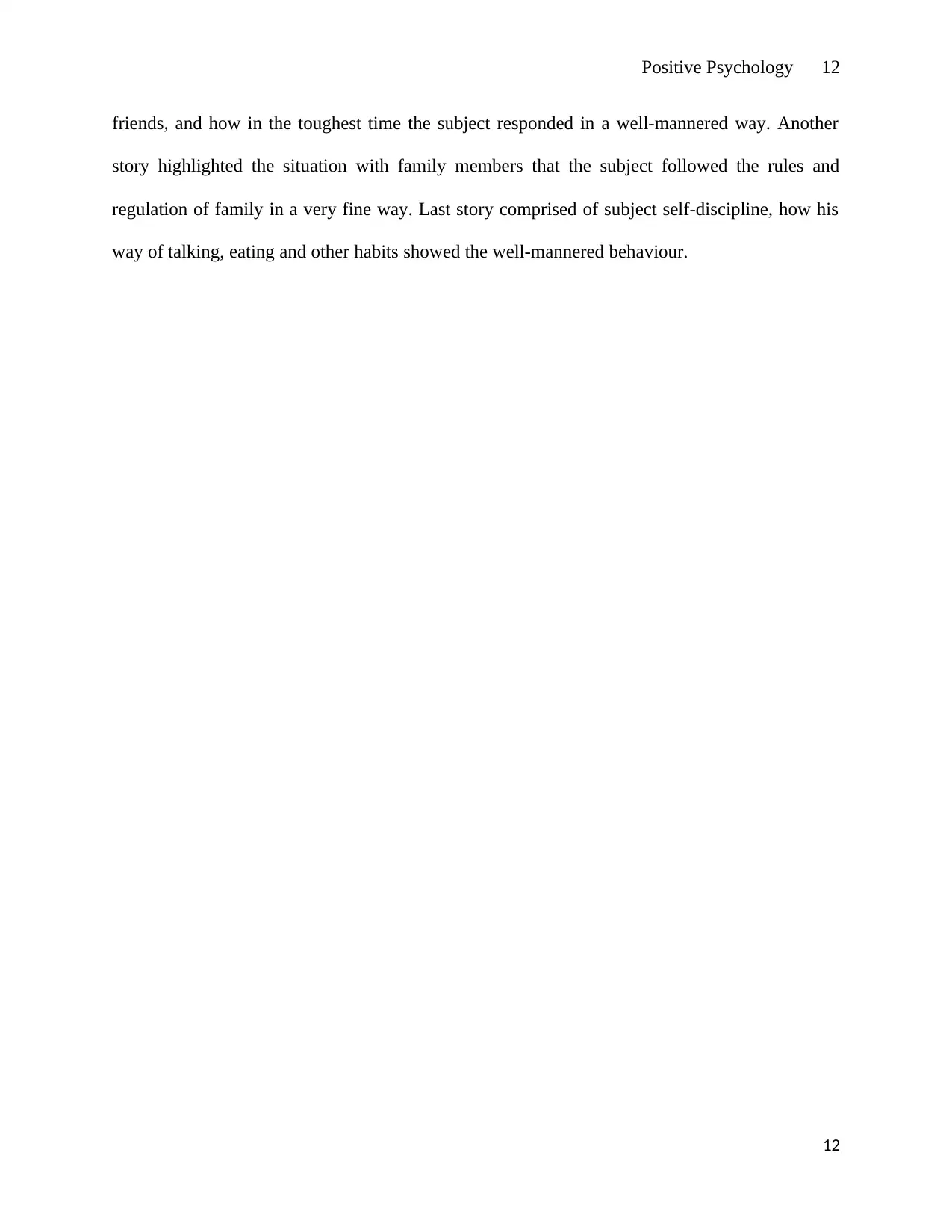
Positive Psychology 12
friends, and how in the toughest time the subject responded in a well-mannered way. Another
story highlighted the situation with family members that the subject followed the rules and
regulation of family in a very fine way. Last story comprised of subject self-discipline, how his
way of talking, eating and other habits showed the well-mannered behaviour.
12
friends, and how in the toughest time the subject responded in a well-mannered way. Another
story highlighted the situation with family members that the subject followed the rules and
regulation of family in a very fine way. Last story comprised of subject self-discipline, how his
way of talking, eating and other habits showed the well-mannered behaviour.
12
⊘ This is a preview!⊘
Do you want full access?
Subscribe today to unlock all pages.

Trusted by 1+ million students worldwide
1 out of 22
Related Documents
Your All-in-One AI-Powered Toolkit for Academic Success.
+13062052269
info@desklib.com
Available 24*7 on WhatsApp / Email
![[object Object]](/_next/static/media/star-bottom.7253800d.svg)
Unlock your academic potential
Copyright © 2020–2025 A2Z Services. All Rights Reserved. Developed and managed by ZUCOL.





